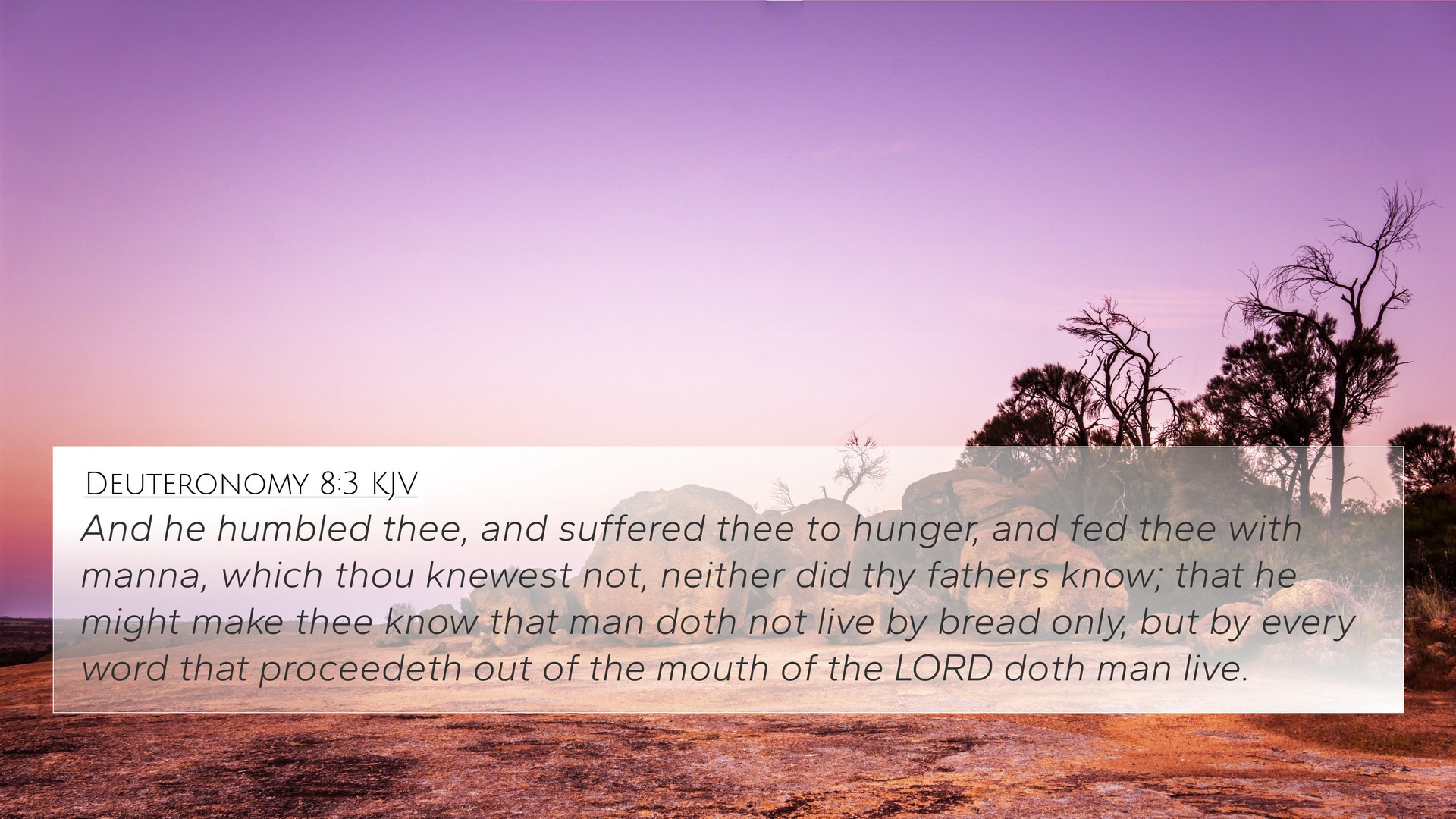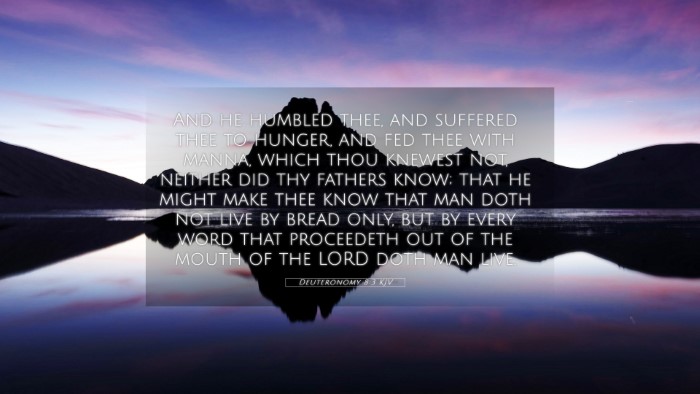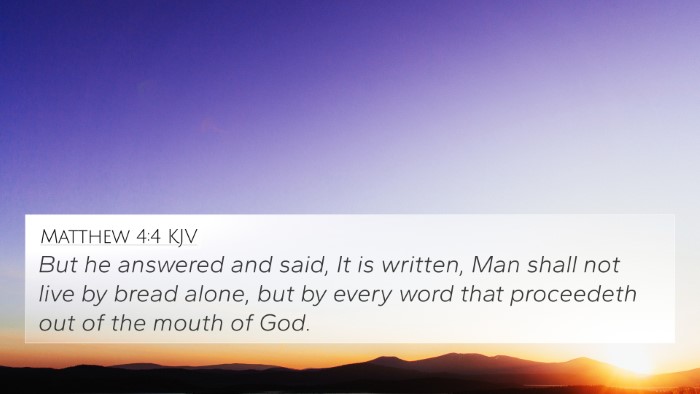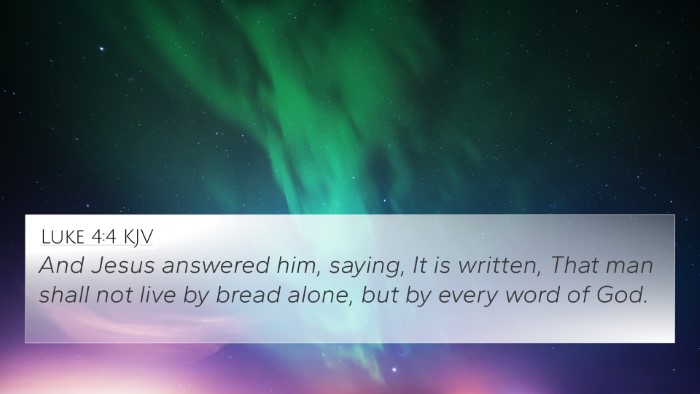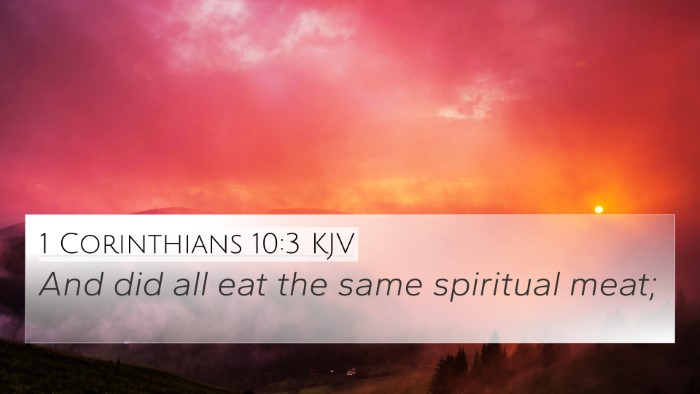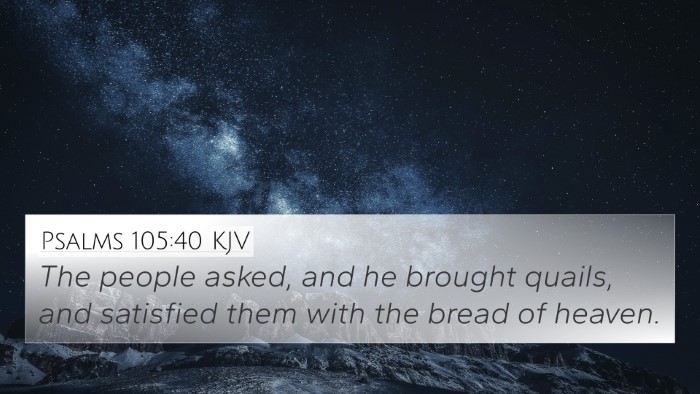Understanding Deuteronomy 8:3
Deuteronomy 8:3 states:
“And he humbled you and let you hunger and fed you with manna, which you did not know, nor did your fathers know, that he might make you know that man does not live by bread alone, but man lives by every word that comes from the mouth of the Lord.”
Summary of Meaning
This verse serves as a profound reflection on the nature of dependence upon God versus material sustenance. The experience of hunger and subsequent provision of manna illustrates that spiritual nourishment is just as critical, if not more so, than physical sustenance.
Interpretative Insights
- Matthew Henry: Emphasizes that God sometimes permits His people to be humbled and to hunger so that they might learn reliance on Him. The miraculous provision of manna serves as a lesson that sustenance comes from divine instruction, not just from physical provisions.
- Albert Barnes: Notes that this verse highlights the importance of spiritual sustenance, indicating that true life and strength are derived from God's word. He contextualizes the Israelites' journey as a period of testing and formation of faith.
- Adam Clarke: Points out the unique nature of manna, which is described as something neither the Israelites nor their ancestors had known. This signifies a shift in understanding what it means to rely on God and Scripture for life.
Thematic Connections and Cross-References
The verse connects deeply with several themes and other Biblical texts:
- Matthew 4:4: “But he answered, ‘It is written, Man shall not live by bread alone, but by every word that comes from the mouth of God.’” This New Testament verse directly quotes Deuteronomy 8:3, establishing a strong link between the Old and New Testaments about spiritual nourishment.
- John 6:35: “Jesus said to them, ‘I am the bread of life; whoever comes to me shall not hunger, and whoever believes in me shall never thirst.’” This highlights the fulfillment of the spiritual need through Jesus, relating back to the concept introduced in Deuteronomy.
- Psalm 119:103: “How sweet are your words to my taste, sweeter than honey to my mouth!” This underscores the sweetness and necessity of God’s word, which sustains life.
- Romans 10:17: “So faith comes from hearing, and hearing through the word of Christ.” This verse reiterates the idea that faith and life are sustained through the Word of God.
- 1 Peter 2:2: “Like newborn infants, long for the pure spiritual milk, that by it you may grow up into salvation.” This indicates the importance of spiritual nourishment for growth in faith.
- James 1:17: “Every good gift and every perfect gift is from above, coming down from the Father of lights.” This emphasizes that all sustenance, both physical and spiritual, comes from God.
- Hebrews 4:12: “For the word of God is living and active, sharper than any two-edged sword…” This illustrates the power and efficacy of God’s word in spiritual life.
Application and Reflection
As we reflect on Deuteronomy 8:3, we are encouraged to:
- Recognize God’s Provision: Understand that in times of spiritual hunger, God's word is essential for life.
- Embrace Spiritual Dependency: Learn to trust not just in physical needs, but in the sustaining power of scripture.
- Engage Deeply with Scripture: Develop a habit of seeking God’s wisdom and direction through reading and meditating on His Word.
Connected Bible Study Themes
The verse opens discussions surrounding Biblical themes such as:
- Dependency on God
- The significance of obedience to God’s Word
- Contrast between physical and spiritual sustenance
- God’s testing and provision during trials
Tools for Further Study
For those interested in deeper insights, consider using the following resources:
- Bible concordances for identifying scripture references
- Tools for Bible cross-referencing to explore related texts
- Cross-reference Bible study guides for structured analysis
- Comprehensive Bible reference resources for contextual studies
Conclusion
Deuteronomy 8:3 serves as a powerful reminder of the necessity of both physical and spiritual sustenance in the life of a believer. It calls us to seek God's wisdom and provision as we navigate life's challenges, grounding our understanding in the truth that we live not by bread alone, but by every word from the mouth of the Lord.
